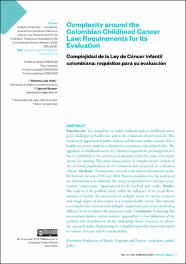Complexity around the Colombian Childhood Cancer Law: Requirements for its Evaluation

Ver/
Descargar
(application/pdf: 122.1Kb)
(application/pdf: 122.1Kb)
Fecha
2023-06-02Autor(es)
Arias Quijano, Nohora Lucia
de Salazar, Ligia
Metadatos
Mostrar el registro completo del ítemResumen
The complexity of health problems such as childhood cancer poses challenges in health care and in the evaluation of interventions. This situation is aggravated if policy makers and decision makers assume that a healthcare system works in a delimited environment with defined rules. The approach to childhood cancer in Colombia required the promulgation of a law to contribute to the reduction of mortality from this cause with implications for nursing. This study characterized its complex nature, evidenced the potential implications in its evaluation and proposed an evaluation scheme. Methods: Documentary research with related information available between the years 2010 and 2020. Bowen's guidelines for the analysis of the information were followed, the categories included were relevant actors, context, components, organizational levels involved and results. Results: The analysis of the problem made visible the influence of the social determinants of health, the interaction of multiple actors in various scenarios and a high degree of uncertainty in a complex health system. The response is a complex intervention with multiple components and actors involved at different levels to achieve the proposed results. Conclusion: Evaluating this intervention implies context-sensitive approaches, a clear definition of the problem and identification of the underlying theory necessary to achieve the expected results; Establishing its evaluability provides important inputs to reorient its scope and its transferability.

